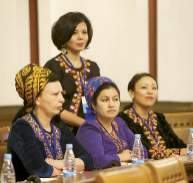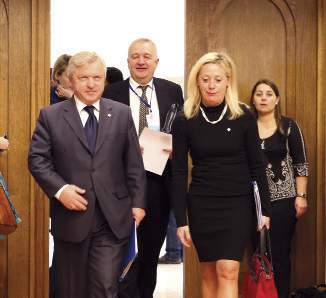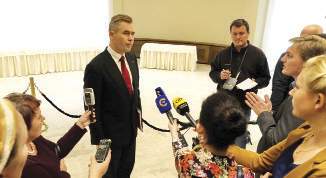Belarus ranked 36th out of 173 countries for children’s well-being index and well co-ordinated protection systems are needed to prevent violence towards children

Participants of UNICEF conference
Minsk recently hosted the international high-level UNICEF conference for Central and Eastern Europe and the CIS — Strengthening National Mechanisms for Protection of Children fr om Neglect, Violence, Abuse and Exploitation. The UNICEF Regional Director for Central and Eastern Europe and the CIS, Marie-Pierre Poirier, expressed gratitude to the Belarusian Government ‘for the opportunity to bring together representatives of countries across the region, for constructive discussion of acute topics, and to assess progress in the sphere of creating comprehensive systems for child protection’ as well as ‘to analyse advanced experience, to develop recommendations and to help co-ordinate our future actions in the sphere of protecting children from all forms of violence’.

Anatoly Tozik and Marie-Pierre Poirier
Statistical data across the Central and Eastern Europe and Central Asia confirms that violence remains part of daily life for many children and teenagers — regardless of their age, gender, economic and social circumstances, culture, religion, ethnic background or capabilities. Cases of violence happen in various situations, including in environments wh ere children should feel safe: at home, school, educational institutions and justice agencies.
According to nationwide research (MICS), two out of three children in the region are subject to domestic violence. Junior children and those with disabilities are at greater risk, having fewer opportunities to speak out and seek support. They suffer greater likelihood of receiving irreversible damage to their psychological or physical wellbeing.
“These figures testify to the fact that we must now act. We can’t postpone the protection of children from violence,” notes Marie-Pierre Poirier. “We should immediately make joint efforts — for at least two reasons. Firstly, research proves that exposure to violence can change neuro-development and affect children physically, mentally, emotionally and socially. Violence negatively affects the ability to learn and prevents youngsters from establishing positive relationships. It provokes emotional disorders and can lead to aggressive behaviour. Secondly, violence damages not only children but local communities and, more widely, the whole country. This brings a cost-factor for society, distracting key resources from other social needs and creating a significant financial burden on healthcare and social provision systems. This hampers potential socio-economic development.”

Pavel Astakhov interviewed
The protection of children from all forms of violence is an urgent need. It is our ethical duty to protect human rights, and requires efficient state management and strategic economic investment.
Our governments and civil organisations across the region are making considerable efforts to stop violence towards children. Eleven countries in the region have officially joined the UNICEF global campaign — Ending Violence Against Children. “Though we have much to be proud of already, we still see cases of violence against children. Progress is too slow and too irregular, while our successes are too fragmentary. Strategies and programmes have numerous gaps which require urgent elimination,” admits Marie-Pierre Poirier. “The price of delay is too high - for each child and for each country. Together, we can break the vicious circle of violence against children.”
The international conference was held in Minsk: the capital’s first such high-level event on child protection. Over 150 participants attended, as part of 19 official delegations, sharing their views, experience and best practices in creating efficient child protection mechanisms, and in strengthening inter-agency co-operation and national institutions’ strategies in child rights protection. Various challenges were discussed: all acute for the region.
Belarus is ranked 36th out of 173 countries on the children’s wellbeing index: among the most prosperous countries worldwide, noted Belarus’ Deputy Prime Minister, Anatoly Tozik, speaking during the UNICEF high-level international conference for Central and Eastern Europe and the CIS — Strengthening National Mechanisms for Protection of Children from Neglect, Violence, Abuse and Exploitation. He underlined, “Unfortunately, the world is not always as child-friendly as we would wish. The protection of child rights and legal interests is a major task for the Government and an unconditional priority of Belarus’ domestic policy. Our country has developed a sustainable national mechanism to protect the rights of children. Belarus works hard to make sure every child is happy.”
The Deputy PM added that the focus is on child education and healthcare provision, for children and mothers, with Belarus promoting traditional families and responsible parenthood. The country has an efficient instrument with which to identify dysfunctional families at an early stage. The number of orphanages is falling, as ever more children are raised by foster families. Much work has been done to protect children from various forms of violence. Mr. Tozik asserts that Belarus is ready to adopt the world’s best practices and share its own expertise and knowledge in child protection. “The conference will encourage additional measures to improve and strengthen the national system of child protection,” he emphasised, thanking UNICEF for its support.











